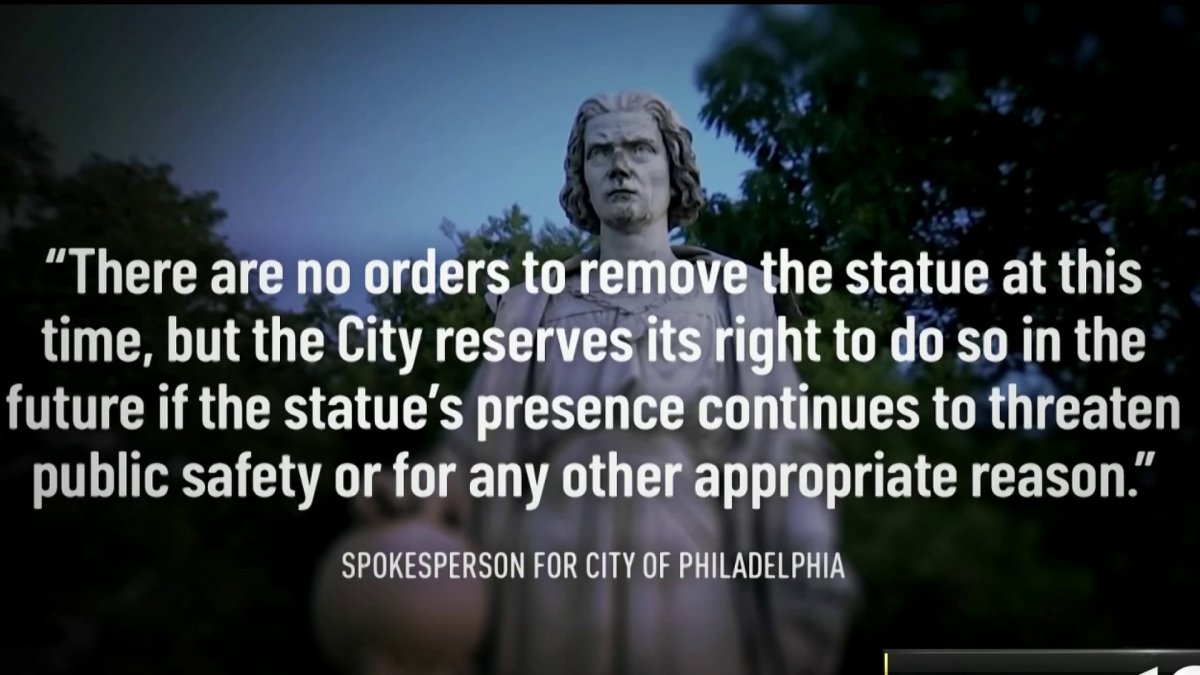
City officials are responding to weekend clashes between “protectors” and protesters at the South Philadelphia Christopher Columbus statue. NBC10’s Lauren Mayk has the details.
The Internal Affairs Division is now investigating the police response to a group of men, some armed with guns or bats, who gathered in South Philadelphia over the weekend to defend the Christopher Columbus statue.
“There is an active investigation in reference to this incident by our Internal Affairs Division,” a Philadelphia Police spokesperson told NBC10. “No further information at this time.”
The men were spotted at Marconi Plaza both Saturday afternoon and Sunday evening, claiming they were there to protect the statue. The gatherings occurred amid incidents nationwide of other effigies of the Italian explorer and colonizer being defaced or torn down, with people pointing to Columbus' brutality against indigenous people in the Americas as reason for why he should not be revered.
On Saturday, a reporter with Unicorn Riot – a nonprofit journalism organization that describes its work in part as “dedicated to exposing root causes of dynamic social and environmental issues” – was confronted by some of the men as he took video of the proceedings.
Some men tried to swat his cellphone away while another grabbed and pulled his bicycle. Another man sliced the bike’s tires.
Philadelphia Police Department officers were present, but largely observed as events did not seem to escalate beyond those incidents, though they did stand between the reporter and the men at times and physically pushed back one man as he tried to swat away the reporter’s phone.
Other people with the group of men also intervened on multiple occasions, at times restraining them and urging nonviolence.
Local
Breaking news and the stories that matter to your neighborhood.
“We’re preserving culture. We’re preserving heritage and history. This has nothing to do with racism,” one of the men said of their reasons for being at the plaza.
Video shows the reporter eventually forced to leave by a Philadelphia police captain, who tells him he is “aggravating” a “volatile situation.”
On Sunday, the group returned to the Columbus statue and clashed with some protesters who wanted to see it removed. The group remained in the plaza throughout the night despite being asked by police to move.
Both Mayor Jim Kenney and District Attorney Larry Krasner spoke out against the group of men “protecting” the statue.
On Monday, Kenney announced plans for a "public process" to consider the future of the statue. He also said a boxing apparatus will be installed around the statue on Tuesday to preserve it while the process takes place.
"Given that many are now calling for the removal of the statue, and others believe it should remain, I have directed the Art Commission to review the statue, its location and its appropriateness in a public park," Kenney wrote.
"We are committed to listening to all points of view and moving forward in the best way to heal our deep divides."
On Tuesday morning, the area around the statue was quiet, but the debate over its future continued.
The weekend's events echo what happened in the Fishtown neighborhood nearly two weeks ago.
There, a group of white men – also armed with baseball bats – defied a citywide curfew and intimidated protesters marching against racism and police violence in the wake of George Floyd’s death. They also assaulted a WHYY reporter.
Mayor Kenney described the men as “vigilantes” and criticized police officers, who he said largely stood by and fraternized with the armed group.
Philadelphia has become somewhat of a cultural flashpoint in recent weeks. Protests against racism have led to the removal of a statue and mural of former mayor and police commissioner Frank Rizzo, himself of Italian heritage.
Rizzo, a native of South Philadelphia, which still has a large population of people with Italian roots, is both celebrated and criticized in the city. Some see him as a devoted public servant while to others he represents systemic racism and brutality against minority communities.